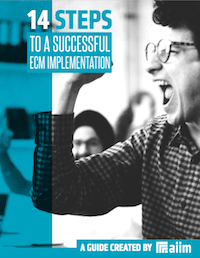The AIIM Blog
Keep your finger on the pulse of Intelligent Information Management with industry news, trends, and best practices.
Intelligent Information Management (IIM)
AIIM recently published an article called "Eight Factors to Consider In Creating an Information Management Strategy." The article included eight questions to ask yourself about the people, processes, and technology that will be affected by your information management strategy. Here are eight more factors you should consider when creating an information management strategy: 1. Talk to Your Employees Technology decisions have traditionally been handed down from the top, forced on employees along with a training manual and a help desk number. But there’s a fundamental difference between giving your employees technology that they have to use and giving them the technology they want to use. Before you formulate your information management strategy, consider talking with your employees. Do they feel enabled—or disabled—by technology? Chances are, they have some pretty valuable insights into what isn’t working, and maybe even some technology recommendations. Individuals and departments often find creative ways to work around cumbersome infrastructure and platforms, implementing wikis, extranets, and cloud content management platforms to manage better and share information. Take a look at the organic processes your employees have put in place and the solutions they’ve adopted—if they’re working, why not consider broader deployment?
Share
Enterprise Content Management (ECM)
Enterprise content management is already composed of a complex, broad set of ideas and technologies - over the next 5 years, a convergence of trends across multiple software categories will have a massive impact on this space. This list is by no means exhaustive, as vendors will also need to deal with evolving challenges around security, retention, workflow, capture, and other aspects of ECM, but the following eight trends will fundamentally change how we build and deploy content management solutions:
Share

Making an ECM implementation successful requires planning and attention to detail. The best way to create the right solution is to identify organizational goals and priorities. Learn how to manage a successful implementation in our free guide.
Cloud | Collaboration | Mobile
Share
Cloud | Enterprise Content Management (ECM)
One of the more exciting developments in the content management space in the past few years as the industry "mainstreams" is the development of a wide variety of models for delivery of content management functionality. In addition to the traditional in-house software solutions, the market now includes a host of SaaS, open source, and cloud solutions. You may be wondering if a cloud-based content management solution is right for your business. We can't answer that for you, but we can help you make an educated decision by sharing some of the benefits and limitations.
Share